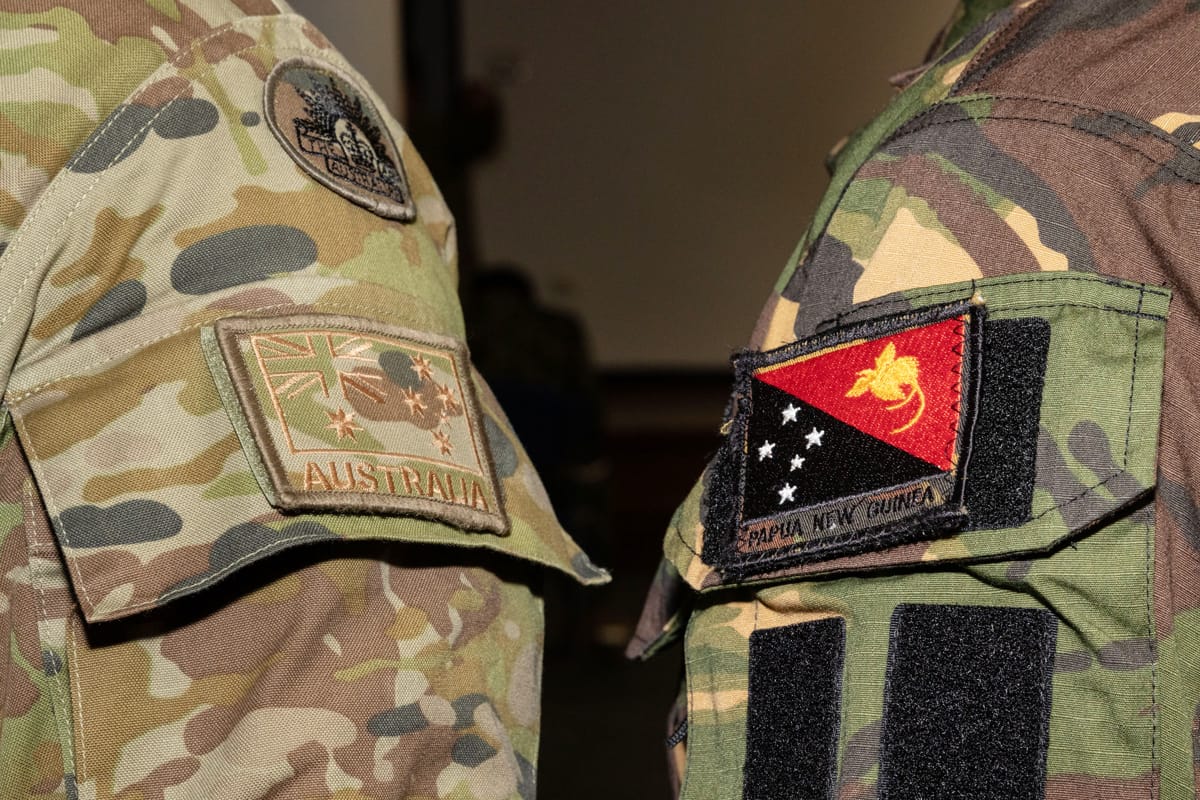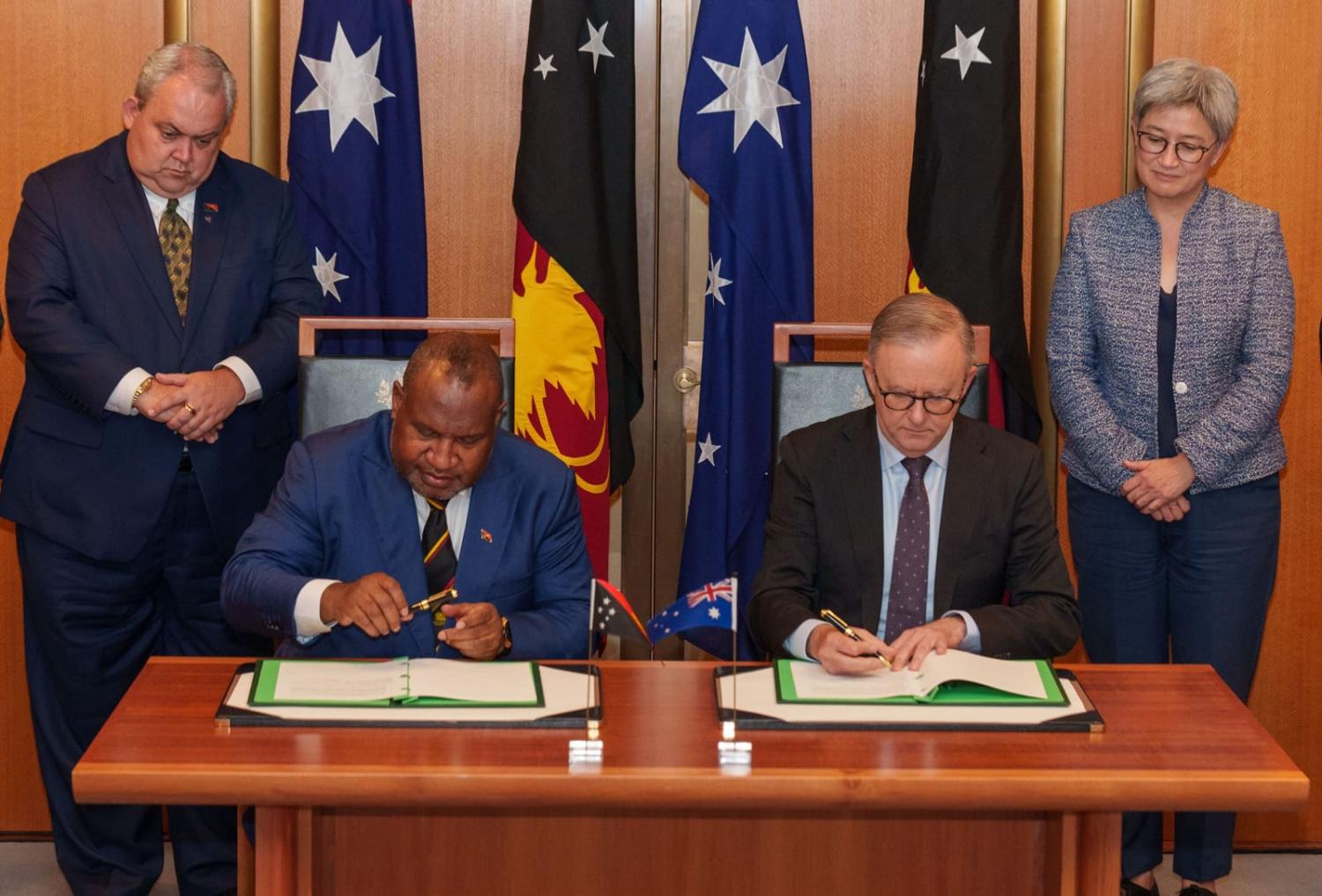The leaders of Australia and Papua New Guinea put pen to paper on a bilateral security agreement this month. Known formally as the Agreement between the Government of Australia and the Government of Papua New Guinea on a Framework for Closer Security Relations, it was signed in Canberra on 7 December.
With geopolitical interest increasing in the region, this landmark agreement adds to the growing list of bilateral security arrangements PNG has signed with other partners (including the United States, United Kingdom and France) across the past year. The agreement with Australia, however, is the first document entered into by PNG that looks to foster “comprehensive security cooperation”, which will address not only traditional security threats, but also non-traditional security concerns including cyber-security, climate change, critical infrastructure and gender-based violence.
Both countries share a deep history from Australia’s colonial administration, the Second World War, and present-day assistance, with PNG being Australia’s largest donor funding recipient. The signed text reflects a balance that was struck through almost a year of formal negotiations to address the concerns of both parties, ranging from respect of sovereignty and recognition of PNG as a security partner in the Pacific, to the removal of language that may be seen as favourable or exclusionary towards other potential security partners.
What follows is a brief insight from a technical perspective into the intended operation of the agreement, in attempting to address these contentious issues from where I sat, on the PNG side at the negotiation table.
Framework Agreement vs Treaty
In negotiations, the preliminary issue to overcome was whether to refer to the arrangement as a “Treaty” or “Framework Agreement”. The security agreement stems from the Comprehensive Strategic and Economic Partnership signed between Australia and PNG in 2020, which called for the countries to develop a bilateral security treaty. While this seems like trivial preferences to terminology, the use of the term “treaty” would have entailed constitutional implications on the part of PNG.
Under PNG’s Constitution, before a treaty may legally enter into force it must be ratified by parliament and given effect through domestic law. Both parties entered discussions on the understanding that no laws should be changed to give effect to the envisaged cooperation. This was in part because PNG has no existing legislation that provides for a comprehensive security pact such as that envisaged in the bilateral security agreement with Australia.
To address this issue, negotiators agreed to adopt the structure of a “Framework Agreement” which, while still a legally binding document, provides the overarching framework for cooperative activities between the countries. The specifics of “security assistance” are to be fleshed out under implementing agreements (Article 3) and entered into within the allowable parameters of existing law.

Elevation of PNG as a regional security partner, and the scope of activities
The preference for language reflecting Australia’s Pacific-family approach was met with some hesitation by PNG officials who preferred language to be bilaterally focused. As such, the preambular text and guiding principles under Article 1 will see PNG elevated as a bilateral partner, within which cooperation is necessary to maintain security within the region as a whole.
Immediate priorities under the bilateral security agreement are PNG’s growing internal security concerns through police cooperation. Both countries were cautious to avoid a repeat of the 2000s-era “Enhanced Cooperation Program”, which was found by PNG’s Supreme Court to be unconstitutional in 2005. As such, police cooperation under the auspices of the new agreement are to be an enhancement of the existing institutional partnership with the Australian Federal Police that works in an advisory capacity, as opposed to donning the colours of the Royal Papua New Guinea Constabulary and walking the beat to enforce PNG laws.
Other areas of cooperation will include continued engagement in the traditional security areas of defence, humanitarian aid and disaster relief, and correctional services. While it can be realistically expected that the bulk of cooperation will see PNG receiving assistance from Australia, PNG will reciprocate with the provision of personnel such as the assistance that was provided during the 2019–20 bushfire crisis and most recently through the appointment of a PNGDF Lieutenant Colonel as deputy commander to an Australian combat brigade.
As for non-traditional security areas, both countries have adopted an approach where the areas of mutual security cooperation under Article 3 will be implemented through institutional partnerships. This approach proves beneficial for PNG in particular, which still does not have all the necessary institutions in place to cooperate at the technical level with other Australian government agencies (such as in the area of cyber-security). These capacity gaps, however, provide a clear indication of priority areas for capacity building in PNG under the bilateral security agreement.
Third parties, and what’s next
Concerns around protection of sovereignty led to lengthened negotiation over the involvement of, and PNG’s right to engage with, third party security partners. Australia conveyed concerns over deconflicting and ensuring interoperability where Australian assistance has already been engaged to provide security assistance. PNG, however, was steadfast on its longstanding foreign policy direction of “friends to all, enemies to none”, and maintaining the sovereign right to deal with other countries without having to, or being perceived as being required to, disclose such intentions prior to engaging.
This position was echoed during the signing, with PNG Prime Minister James Marape stating that there is no exclusivity, and that PNG will always protect its interests to have economic and security relationships elsewhere.
What we are left with is a singular reference to third parties under Article 6 on security assistance, which requires the parties to use best endeavours to respond to and coordinate the involvement of third parties in security assistance.
The foundation for a renewed sense of bilateral cooperation has been set by the bilateral security agreement. What comes of it can only be seen over time. The first order of business is the design of the implementation agreements by bureaucrats to begin cementing their partnership as the key security partners in the Pacific.
Oliver Nobetau is a Senior Legal Officer in the Office of the State Solicitor of PNG’s Department of Justice & Attorney General. His primary area of practice focuses on issues relating to national security and climate change. Oliver Nobetau was involved, in his official capacity, in the final stages of negotiations of the BSA by providing legal advice to PNG’s negotiating team.


